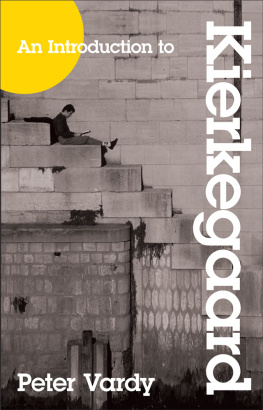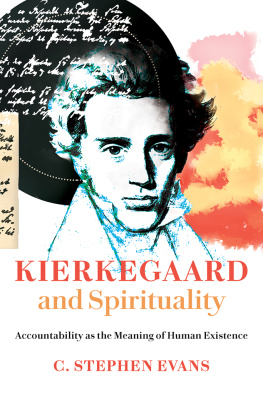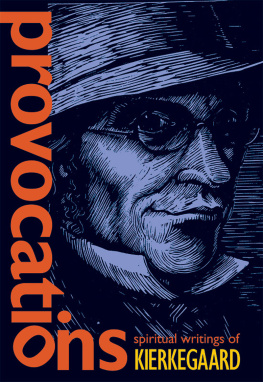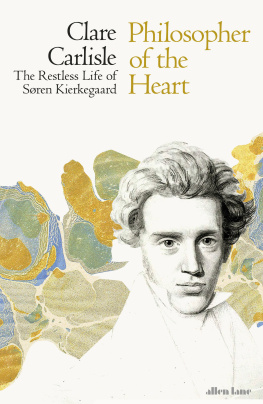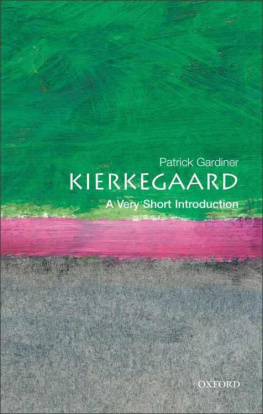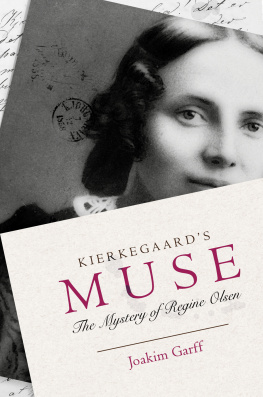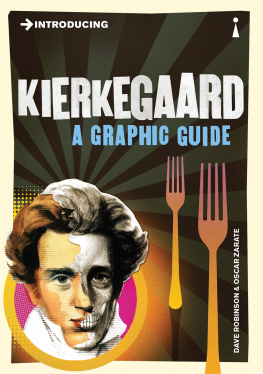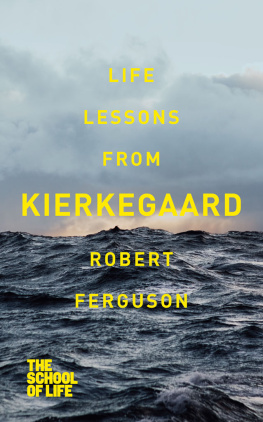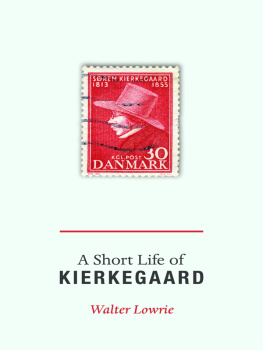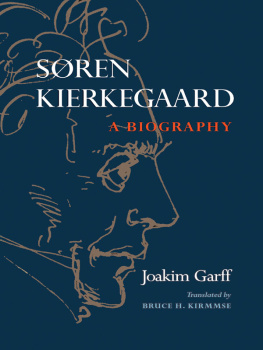Stephen Backhouse has given us a wonderfully lively and sympathetic portrait of one of the greatest minds of the nineteenth century, sparing us nothing of Kierkegaards abrasive, contrarian personality, but also illuminating the extraordinary courage and spiritual depth of the man. We have waited a long time for such an accessible introduction, growing out of deep study of the abundant original sources and bringing them alive with a light and sure touch.
Rowan Williams, Master of Magdalene College and former Archbishop of Canterbury
Stephen Backhouses Kierkegaard: A Single Life is an extremely useful book that makes Kierkegaard accessible to those just beginning to know him. Backhouses account of Kierkegaards life is exemplary but particularly useful is his summary of Kierkegaards works.
Stanley Hauerwas, Gilbert T. Rowe Emeritus Professor of Divinity and Law at Duke University
Drawing on the wealth of new biographical material that has become available in the last twenty years, Backhouses life of Kierkegaard sets the Danish thinker in his time and place and does so with confidence and verve. Few books about this most subtle and elusive of figures could be described as page-turners, but Backhouse combines a fast-moving style with a strong grasp of the big issues that makes this a compelling read. For those who have not yet read Kierkegaard himself, this will leave them wanting to do sowhich must be the best outcome for any work of this kind.
George Pattison, Professor of Divinity, University of Glasgow
This is an extraordinarily likeable book about a not-very-likeable, though fascinating, figure. This is not hagiography; Backhouse gives the full measure of Kierkegaard and loves him in all his weirdness. Backhouse is a great storytellerwitty, imaginative, and with an eye for irony and humor. This book fills a need for an introduction for the educated nonspecialist to Kierkegaards life and thought, which are inseparable. How lucky we are that this need has been filled with such flair.
Dr. William T. Cavanaugh, Director, Center for World Catholicism and Intercultural Theology, DePaul University
Almost every road in modern Christianity leads back, at some point, to Kierkegaard. Yet few appreciate this fact because weve lacked a knowledgeable and accessible guide. Finally, we have one in Stephen Backhouse. Ive waited my whole life for this book. And so has the church.
Dr. Richard Beck, Associate Professor of Psychology, Abilene Christian University
Stephen Backhouse has written a lively, accessible, and expert introduction to an often misunderstood but hugely influential and prophetic thinker. This is an ideal place to start understanding Kierkegaards life and thought, which has much to say to the contemporary church and world.
Graham Tomlin, Bishop of Kensington, President St Mellitus College
Starting with the astonishing scenes at Kierkegaards funeral, Stephen Backhouse traces the life and impact of this extraordinary, elusive, passionate critic of passionless Christianity. Backhouses book is both learned and accessible, so that the issues that Kierkegaard wrestled with walk off the page to challenge us again today, while the man himself haunts us, calling us and hiding from us, as he did his contemporaries.
Dr. Jane Williams, Assistant Dean and Lecturer in Systematic Theology, St Mellitus College
Kierkegaard believed that to understand a historical figure, one must be able, imaginatively, to become the persons contemporary. In this gripping biography, Stephen Backhouse helps us become contemporaries of Kierkegaard himself. In these pages the Danish thinker comes alive. This book gives us an extraordinary portrait of an extraordinary human being.
C. Stephen Evans, University Professor of Philosophy and Humanities, Baylor University
This book is a fascinating read about a fascinating person. Stephen has skillfully created a glimpse into the life and work of a perplexing and brilliant character.
Luke Norsworthy, podcaster and pastor, Organization-Newsworthy with Norsworthy Podcast and Westover Hills Church
Also by Stephen Backhouse
Kierkegaards Critique of Christian Nationalism The Compact Guide to Christian History
ZONDERVAN
Kierkegaard
Copyright 2016 by Stephen Backhouse
ePub Edition June 2016: ISBN 978-0-310-52089-4
Requests for information should be addressed to:
Zondervan, 3900 Sparks Dr. SE, Grand Rapids, Michigan 49546
Library of Congress Cataloging-in-Publication Data
Names: Backhouse, Stephen, 1976- author.
Title: Kierkegaard : a single life / Stephen Backhouse.
Description: Grand Rapids : Zondervan, 2016. | Includes bibliographical references.
Identifiers: LCCN 2016008389 | ISBN 9780310520887 (hardcover)
Subjects: LCSH: Kierkegaard, Soren, 1813-1855. | PhilosophersDenmarkBiography.
Classification: LCC B4376 .B33 2016 | DDC 198/.9 [B] dc23 LC record available at https://lccn.loc.gov/2016008389
Any Internet addresses (websites, blogs, etc.) and telephone numbers in this book are offered as a resource. They are not intended in any way to be or imply an endorsement by Zondervan, nor does Zondervan vouch for the content of these sites and numbers for the life of this book.
All rights reserved. No part of this publication may be reproduced, stored in a retrieval system, or transmitted in any form or by any meanselectronic, mechanical, photocopy, recording, or any otherexcept for brief quotations in printed reviews, without the prior permission of the publisher.
Jacket design: Tammy Johnson
Illustration: Red Hansen / Shannon Associates
Interior design: Kait Lamphere
16 17 18 19 20 21 22 23 24 25 26 /DHV/ 15 14 13 12 11 10 9 8 7 6 5 4 3 2 1
For Norman and Vaila
It is a truth universally acknowledged, that a single man in possession of a good fortune, must be in want of a wife.
Jane Austen, Pride and Prejudice
Contents
Acknowledgements
10. A Life Continued
Afterword
Once upon a time, my colleague Lincoln Harvey asked me for a book on the life and thought of Sren Kierkegaard he could read on holiday. I gave him what I had on the shelf. Upon his return, Harvey, an Anglican priest, teacher, and theologian of considerable insight, confessed he had not been able to get through the first chapter. The Kierkegaard he met seemed dense, distant, and unappealing. I knew then that if a disciple of Karl Barth and minister in the established church of England had thought Kierkegaard was irrelevant to him, then something indeed had gone spectacularly wrong. This was the spur for this book.
Lincoln is not alone. It is not just theologians who find the influence of Kierkegaard hovering behind much of their work, only to find the life and thought of the man himself hard to get to know. Journalists, philosophers, artists, novelists, musicians, psychologists, pastors, politicians, playwrights, therapists, anthropologists, filmmakers, culture critics, historians, and teachersor anyone affected by these professionsalso occasionally stumble across this strange nineteenth-century Danish name (pronounced SOO-ren KEER-ka-gor) and wonder whats up.
To make matters more confusing, Kierkegaards influence seems to transcend any one of the spheres in which he is encountered. Modernists are suspicious of this apparently postmodern thinker who never said anything directly and wrote mostly under pseudonyms. Postmodernists love the multiple voices but are suspicious of his stubborn adherence to revealed Truth with a capital



